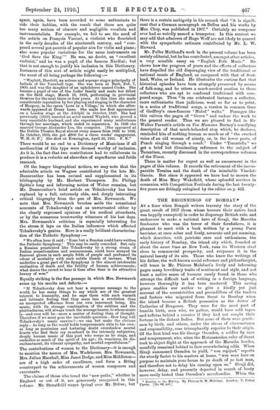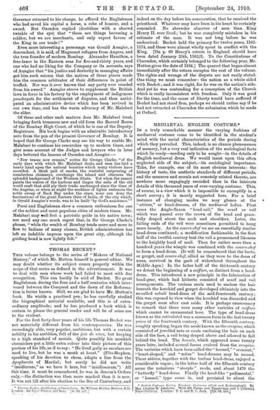THE BEGINNINGS OF BOMBAY.*
AT a time when Bengali writers travesty the story of the great revolt of 1857 (from whose horrors their native land was happily exempted) in order to disparage British rule, and endeavour to make a national hero of Sivaji, the Maratha freebooter who was the terror of their forefathers, it is pleasant to meet with a book written by a young Parsi barrister, at once sober and lively, accurate and yet amusing, which describes, with patriotic care and enthusiasm, the early history of Bombay, the island city_ which, founded at about the same time as New York, runs its Western rival close in commercial prosperity, and surpasses it in the natural beauty of its site. Those who know the writings of his father, the well-known social reformer and philanthropist, will trace in Mr. Phiroze Malabari's lively and informing pages many hereditary traits of sentiment and style, and not least a native sense of humour rarely found in those who attempt the difficult task of writing in a foreign language, however thoroughly it has been mastered. This saving grace enables our author to give a kindly yet just account of the eccentricities and peccadilloes of the traders and factors who migrated from Surat to Bombay when the island became a British possession as the dower of Catherine of Braganza. They were for the most part of
humble birth, men who, we gather, would have sold tapes and taffetas behind a counter if they had not sought their fortune in the distant Indies. But some of them were gentle.
men by birth, and others, under the stress of circumstance and responsibility, rose triumphantly superior to their origin. Of the first kind was Sir George Oxenden, a soldier by race and temperament, who, when the Mohammedan ruler of Surat took to abject flight at the approach of the Maratha hordes, manfully remained behind to face overwhelming odds. When Sivaji summoned Oxenden to yield, "wee replyed," reports the sturdy factor to his masters at home, "wee were here on
purpose to maintain your house to ye death of ye last mane and therefore not to delay his coming upon us." Sivaji did, however, delay, and presently departed in search of booty more easily looted than Oxenden's merchandise. When the By Thiroze B, *alai:art: Teondo,?: T. Tidier • Bombay is this Matins. VBI•i!t• [12q, fit 110,1
Governor returned to his charge, he offered the Englishman who bad saved his capital a horse, a robe of honour, and a sword. But Oxenden replied (doubtless with a shrewd twinkle of the eye) that " these are things becoming a soldier, but we are merchants, and only expect favour of the King in our trade !"
Even more interesting a personage was Gerald Aungier, a descendant, it is said, of Huguenot refugees from Angers, and the true founder of modern Bombay. Alexander Hamilton, a free-lance in the Eastern seas for five-and-thirty years, and one who had no liking for the Company or its servants, says of Aungier that " his justice and dexterity in managing affairs
got him such esteem that the natives of those places made him the common arbitrator of their differences in point of traffiek. Nor was it ever known that any party ever receded from his award." Aungier strove to supplement the British laws in force in his factory by the employment of indigenous panchayats for the settlement of disputes, and thus antici-
pated an administrative device which has been revived in our own time, and has the warm advocacy of Mr. Malabari the elder.
Of these and other such matters does Mr. Malabari treat, bringing forth treasures new and old from the Record Room of the Bombay High Court, of which he is one of the Deputy- Registrars. His book begins with an admirable introductory note from the pen of the present Governor of Bombay. It is hoped that Sir George Clarke may see his way to enable Mr.
Malabari to continue his researches up to modern times, and give some account of the Judges and lawyers who in later days bettered the lessons of Oxenden and Aungier :— " Few traces now remain," writes Sir George Clarke, "of the early days with which Mr. Malabari deals, and man has laid a heavy hand upon the natural beauties which many visitors have recorded. A thick pall of smoke, the wasteful outpouring of numberless chimneys, overhangs the island and obscures the splendid background of the Western Ghats. Yet when the sunset paints the waters of the harbour and tinges the sails of the old world craft that still ply their trade unchanged since the time of the Angrias, or when at night the necklace of lights embraces the noble sweep of Back Bay under the stars, none can deny the fascinations of the great Eastern Gate of India, of the city which, in Gerald Aungier's words, was to be built ` by God's assistance.' "
Parsi and Englishman show a common enthusiasm for one
of the noblest and most populous cities of modern times. Mr. Malabari may well feel a patriotic pride in his native town;
nor need any one much regret that, in Si George Clarke's phrase, "while the wealth of Bombay tends more and more to flow to Indians of many classes, British administration has left an indelible impress upon the great city, although the guiding hand is now lightly felt."











































 Previous page
Previous page